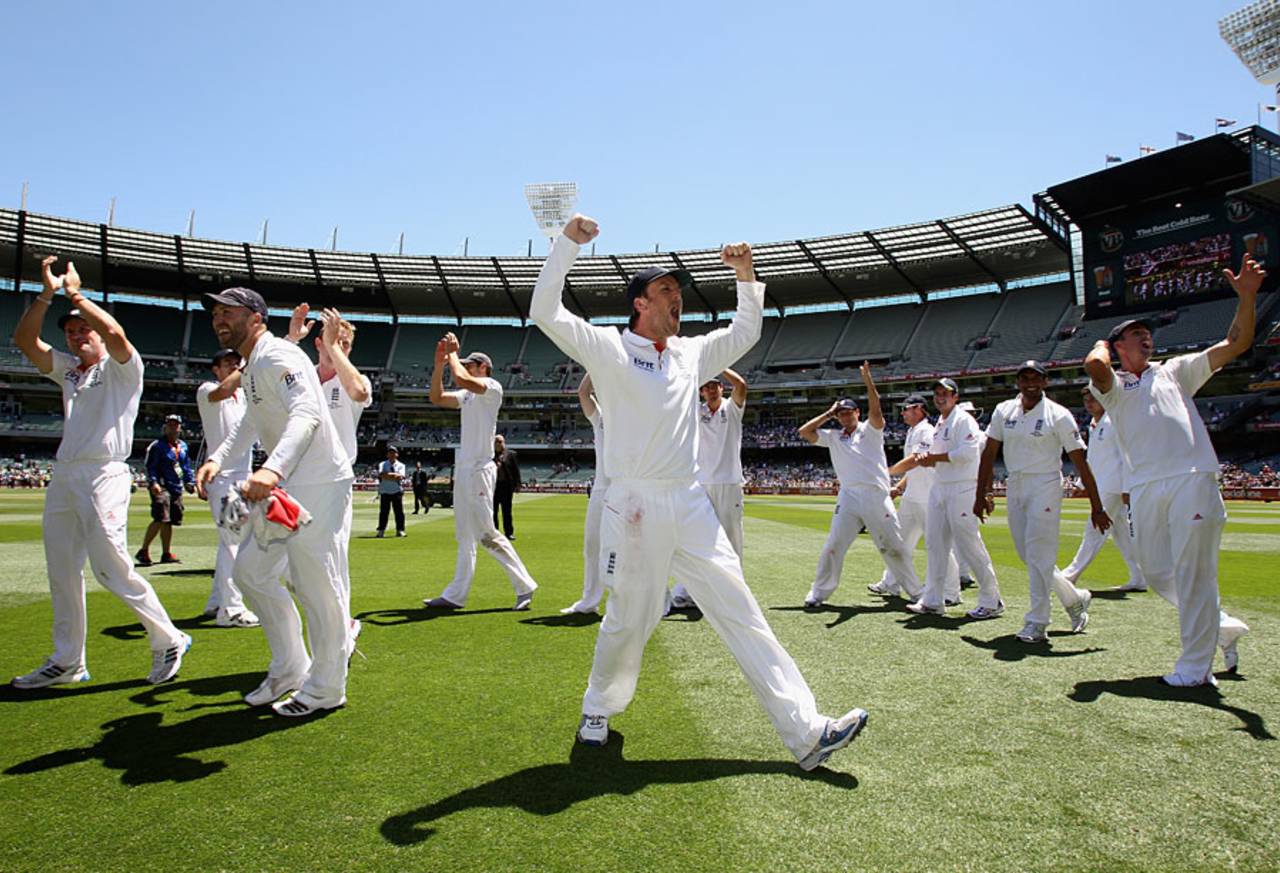The charm of the Boxing Day Test
This annual fixture is special not just for the cricket, but also because it satisfies one of the tenets of Christmas - bringing people together
Jonathan Wilson
21-Dec-2014

The Melbourne Test: a welcome coda to Christmas Day in England • Getty Images
The living room is stuffy. There's a vague fug of alcohol in the air. The smell of turkey fat lingers, as it will for another week or two. Everybody's feeling a little bloated, a little fractious. Eventually somebody breaks the silence and decides it's time to go home. There's a general sense of relief. I wish, back then, when Christmas Day meant all the relatives came round, that we had had the capacity to watch the Boxing Day Test from Melbourne.
It still comes, these days, as a welcome coda to the day, but time has thinned out the relatives and so there's not the same sense of release when the day is over. But even now, when you've washed up and done your best to get rid of the turkey stench from the kitchen, when you've piled the leftovers into plastic boxes so you can eat them for every meal for the following week, when your mam's gone to bed and you're left alone downstairs, able fully to relax for the first time in hours, there's something glorious about sitting there in the dark, just the one table lamp on, the window open to let some air in, even though the North Sea wind is howling down the street outside, watching the green rectangle in the corner of the room, knowing it's all over for another year.
I don't think administrators quite realise how important sport is over Christmas, how essential it has become. Every year, Premier League managers moan about the Christmas programme, about time spent away from family and the intensity of playing four games in a little less than two weeks. Every year there's talk of a winter break, as though that would be a panacea for the problems that bedevil English football. But the Christmas fixtures are part of the tradition and a necessary escape from the stresses of family.
The grass shimmering in the sun, the faces painted with zinc, the sense that Melbourne is somewhere very different from the stormy north-east coast
What, after all, is Christmas? It may nominally be a celebration of the birth of Christ, but its function now is predominantly secular and commercial rather than religious. If it has a spiritual role, it's as a time for pausing, taking stock, getting in touch with friends and family you may not have been in touch with for a year. For me, if Sunderland are at home on Boxing Day - and happily they seem to be more often than not - the match is a chance to go to a game as a fan, to have a couple of pints beforehand and a few more afterwards, to catch up with mates from home, many of whom I don't see from one Boxing Day to the next. The match becomes the reason to meet up; it's the catalyst for the sense of community and reacquaintance that Christmas, if it has a point, should be about.
The Boxing Day Test, both in Australia and South Africa, I assume, performs a similar role, whether people actually go to the game or gather to watch it on television: it's a reason to get together. For me, the cricket is an escape. It's the end of Christmas Day, the start of my time, a way to wind down after the hours of not talking about how much fuller the house used to be while watching David Attenborough DVDs.
And it's also a contrast: the grass shimmering in the sun, the faces painted with zinc, the sense that Melbourne is somewhere very different from the stormy north-east coast. Only three times in my life have I not spent Christmas in Sunderland. In 1994, I was in Dharamsala in northern India, where I could pick up Australian radio coverage, and spent hours listening to England capitulate after half-centuries from both Waughs, then a second-innings ton from David Boon, followed by Shane Warne and Craig McDermott bowling England out for 92. In 2000, I was in Bethlehem, when cricket did elude me. And four years ago I was in the small town of General de Rodriguez just outside Buenos Aires, baffling everybody by the way I kept wandering off from the buffet on the patio to check my laptop, returning with increasing giddiness as Australia were bowled out for 98 by James Anderson and Chris Tremlett.
Essentially, though, I like my Christmases at home. The Boxing Day match is my favourite of the season. But if I were willingly to miss it, it would be to go to Melbourne for the Test. Probably not for England - I'd rather not have the day ruined by some hideous collapse - but just to do the day in reverse, so the Premier League football becomes the heady alternative.
But the point remains that Boxing Day fixtures, whatever the sport, are special, that they have become the vehicles of what Christmas is supposed to be about.
Jonathan Wilson writes for the Guardian, the National, Sports Illustrated, World Soccer and Fox. @jonawils